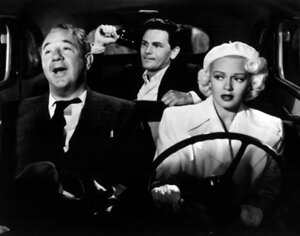Directed by Tay Garnett
I don’t know what to think of this movie. It’s a film noir. It’s a potboiler. It’s the classic 1946 The Postman Always Rings Twice and I like it and don’t like it at the same time.
A drifter (John Garfield) stops at a roadside diner. It’s owned and run by a very a long-in-the-tooth man who happens to be married to a beautiful and simmering wife (Lana Turner). As you might expect (unless you’re the husband), the drifter and the wife hook up.
And then everything goes all to hell for them.
They scheme to get rid of the husband and eventually find themselves on trial for his murder. They become suspicious of one another. There’s blackmail. There’s an illegitimate child. The world darkens around them and it seems they just can’t get a break.
Well, as mentioned, it’s a noir piece, a potboiler.
I suppose it’s the potboiler aspect I have a problem with. There are just too many twists and turns in this movie, so many it starts becoming absurd.
Because it’s a potboiler, it’s over-the-top. This would be okay since it is what is called for in this kind of movie, but it’s a little too over-the-top even for over-the-top.
There is also the husband … Lana Turner with this guy stretches credibility just a bit too much, at least given her performance against that of Cecil Kellaway as the husband. While an explanation for their relationship is given a little later in the film, the whole thing is too unlikely. Could any man married to a woman like that (as played by Lana Turner) be that dull-witted?
In the DVD special features, someone refers to the film as “quintessential noir.” I think, however, the film unintentionally becomes a parody of noir. As with the movie Kiss Me Deadly, it’s a little too noir even for noir (though in a different way than that film).
 Having said all that, I do like the movie. John Garfield is great in it. I’m not terribly familiar with Garfield films, but The Postman Always Rings Twice makes me want to see more of him. Where the movie material is over-the-top potboiler, Garfield’s performance is natural and has some wonderfully subtle touches to it.
Having said all that, I do like the movie. John Garfield is great in it. I’m not terribly familiar with Garfield films, but The Postman Always Rings Twice makes me want to see more of him. Where the movie material is over-the-top potboiler, Garfield’s performance is natural and has some wonderfully subtle touches to it.
Lana Turner is also fabulous in the movie. She doesn’t simply have the look of a beautiful femme fatale, she plays the part perfectly. She also communicates the various conflicts she’s experiencing nicely – the passion, the guilt, the determination and the lies.
Together, Garfield and Turner also communicate the sexual passion and tension with conviction. For them, it’s not necessary to be explicit. It’s in their eyes and their voices; it’s in the performances.
They are also supported by a great cast, including Hume Cronyn as a smarmy, egotistical lawyer. He steals every scene he’s in.
On the DVD, we get another excellent anamorphic transfer from Warner Bros., though it’s not perfect. But the flaws are minor. It’s largely clean and clear and the contrasts are nicely done.
The disc also contains some very good special features beginning with an informative introduction by film historian Richard Jewell. There is also a fairly lengthy, and again informative, documentary, The John Garfield Story. Finally, there are trailers and a photo gallery.
Overall, it’s a good film and a great DVD. Maybe if I watch it again I won’t be so bothered by the melodramatic aspects of it.


